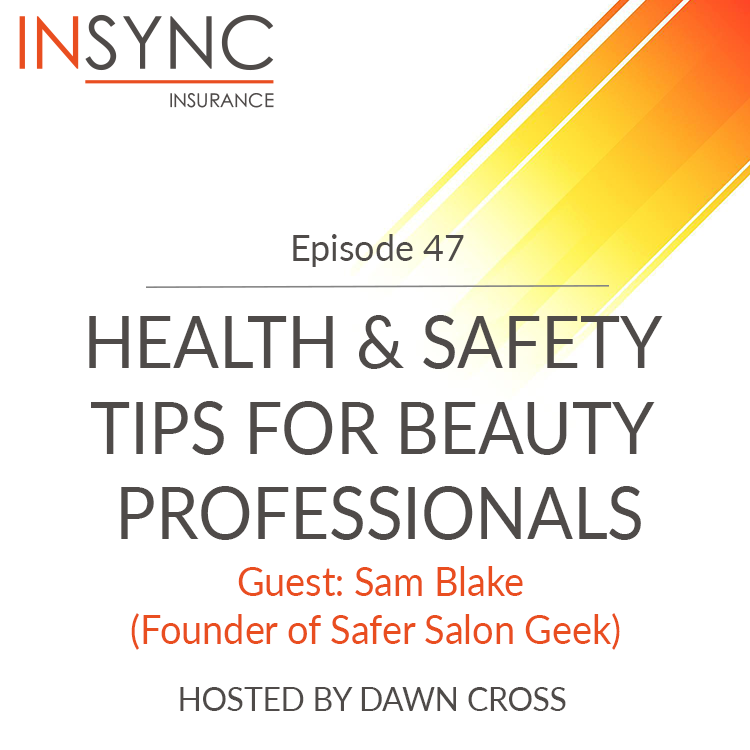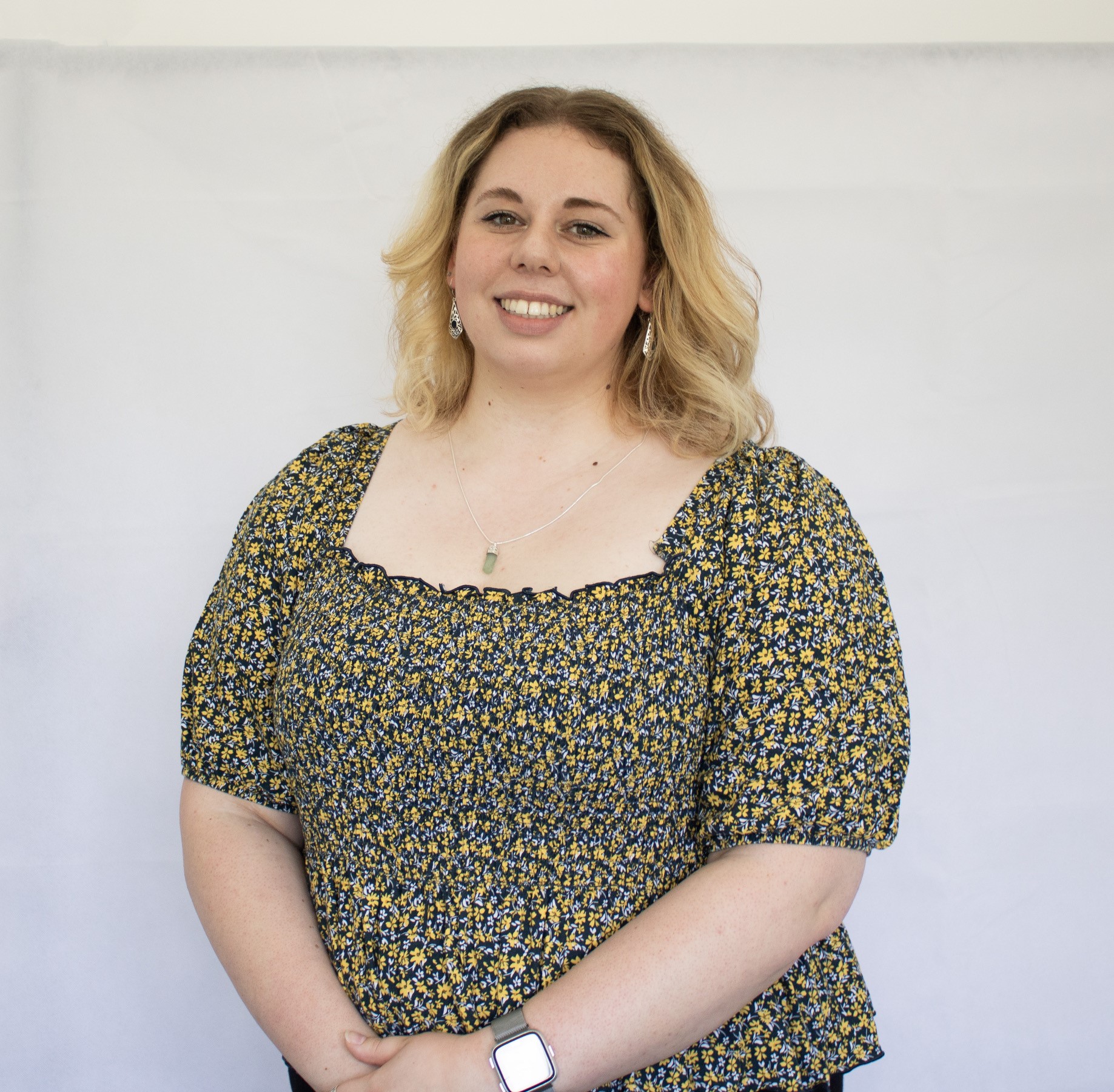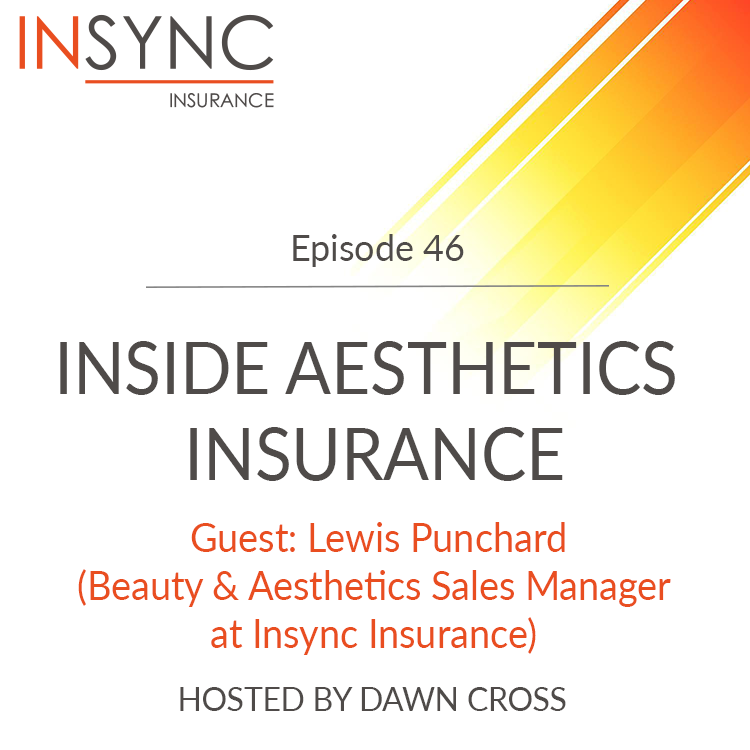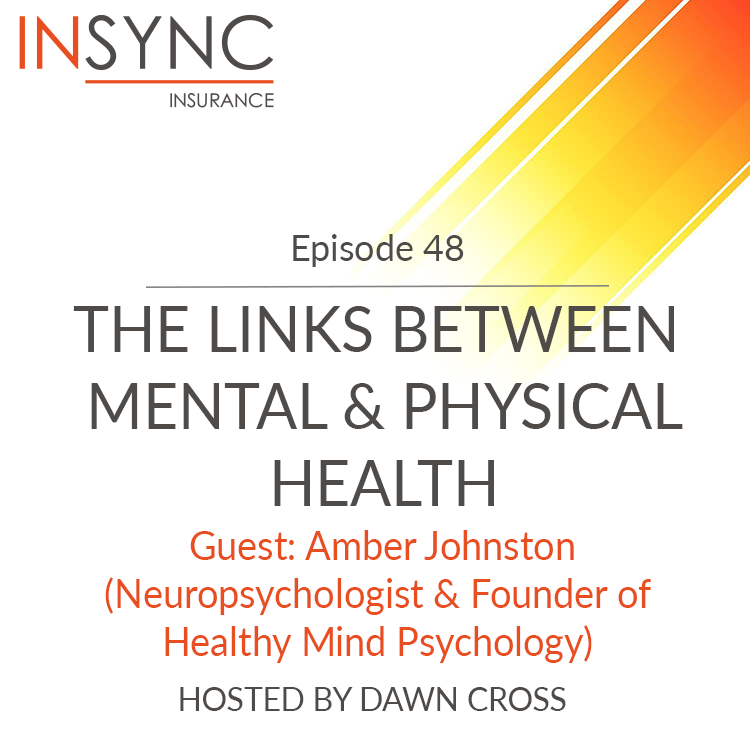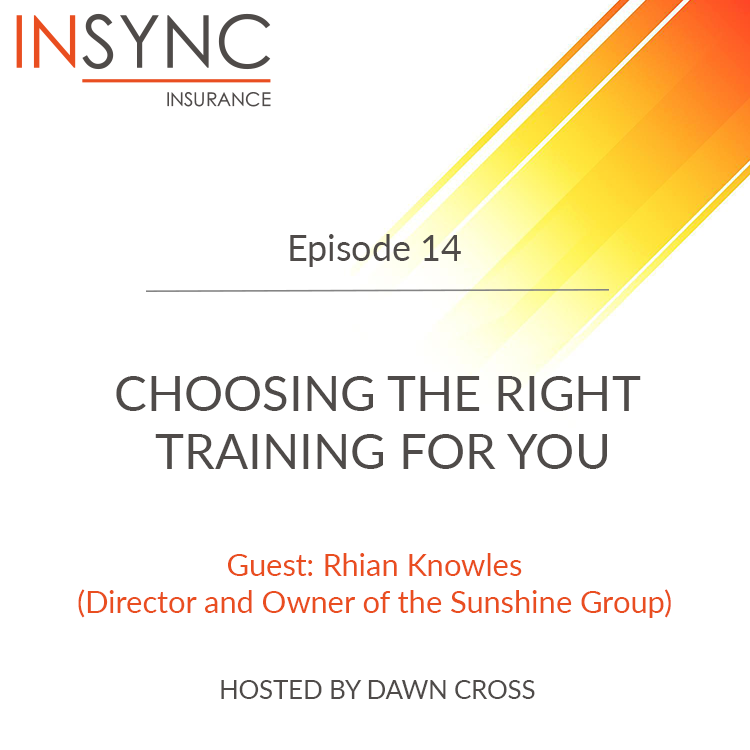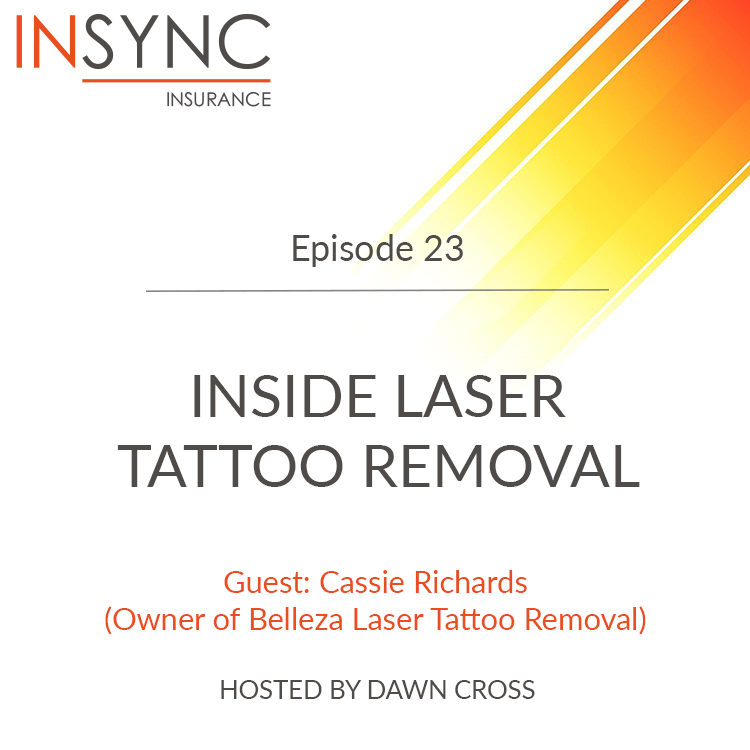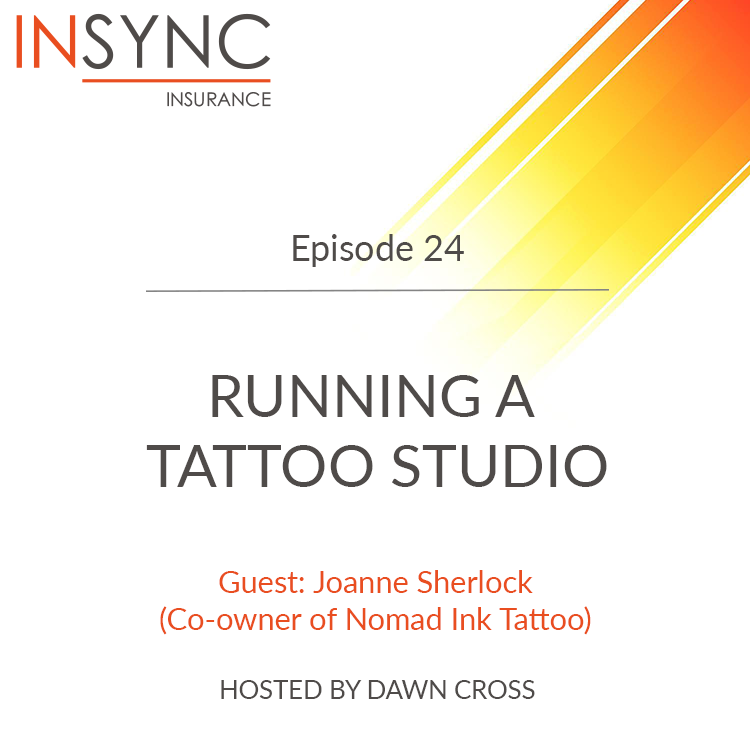Episode Transcript
[00:00:02] Speaker A: Welcome to the Insync Insurance Podcast. I'm your host, Dawn Cross and today I'll be discussing health and safety tips for beauty professionals with Sam Blake, founder of Safer Salon Geek.
If you enjoy our podcast, make sure to leave a rating on your favorite podcast directory.
[00:00:20] Speaker B: Okay, so if we start off with, could you please introduce yourself and what you get up to with your business?
[00:00:27] Speaker C: Okay, so I'm Sam Blake. I am the Safer Salon Geek. I've been in the industry 30 plus years, so I was the white tights brigade. So when I trained in beauty and hairdressing, it was a very long course and my journey within the industry has taken me to where I am now as the Safer Salon Geek. So my thing or things is all about creating safe space businesses. So that's for clients and staff and lone workers.
So it's a kind of culmination of the journey that I've had where I've kind of felt let down, let standpass by employers and experiences that I've had that kind of pre 2020made me go, what can I do to put back into industry to help with safety and health and well being.
So what I do is there's nobody really like me, I don't think in the industry.
So I'm not a health and safety consultant in the normal sense. I class myself as an educator and a guidance advisor. So I'm still ongoing doing health and safety training. But I also look at things like deib, accessibility for clients, sustainability, mental health, both for the person working and for the client and things like body ergonomics, how you're working, the longevity that comes from. I had a car accident and literally had to come out of salon because I couldn't sit doing electrolysis for any period of time. And as an ex sports massage therapist, it was just, I didn't feel there was enough information about body health and what you should be doing to sort of help yourself in salon. So that was when I went into education. So that's a little bit of my background and kind of what I do. But it's, it's not consultancy in its true form. It is literally I educate the industry and give factual information and factual follows out to people.
[00:02:38] Speaker B: Being that's really key as well is although, you know, a lot of courses, especially now, they do have a health and safety element. Obviously they really kind of focus on those, those points and things. But you know, like you said, you, you look way past that. Some people may not even think about accessible beauty treatments, you know, especially for those who, you know, Might shake or, you know, they actually have physical disability. Getting into the salon or even just being able to cope with sitting in a chair for a long period of time due to, you know, whatever condition is something that I reckon everyone should definitely try and be more mindful of, especially working as a practitioner in industry.
[00:03:17] Speaker C: I do the nuts and bolts stuff, so what I do is about the application in the real world. So I was a better education and private lecturer and assessor educator, as we now call it, for over 20 years. So I've taught regulated qualifications, I've constructed them, I've curriculum coordinated and managed them. I'm hot on things like functional skills and soft skills, because the way that the industry is being unregulated at this point, the way that the normal structure of education is, is about your ability to cope with the level of qualification that you're doing.
So with something like what I do, being a level six, you'd be looking at things like Harvard referencing and that kind of academic stuff. So there's that side to the industry as well that I think never really gets spoken about. What is your readiness as a person for that higher level of study that we all know is coming in? And with a high percentage of undiagnosed adhd, add, dyslexia. Now, that was my specialism in further education. I would coach the girls predominantly, who come into the industry and wanted to come into the industry, who were at that stage of the game where they didn't think they'd be able to progress even to level three.
And that's a whole other conversation about, you know, how. How secondary education doesn't champion the industry in the way of. Of how it is now, not how it was back then.
So, yeah, I've. I've got a lot of passions, let's call it that I'm not afraid to talk about and. And kind of blow the lid off a little bit, really, in the nicest possible, diplomatic, factual way, of course. But I think there's a lot that doesn't get considered.
[00:05:14] Speaker B: No, definitely, I agree. How did you get into the industry to begin with, then? Was it something you were.
[00:05:21] Speaker C: Yeah. I've got older parents. Well, my dad's past, but my mum's 91. I mean, you know, her skin is just superb. I've got good genetics. There's 18 years between me and my sister, so I grew up around somebody who was very glamorous, always using skincare.
And it's just something that fascinated me. And I remember way back when, actually, the unconscious bias to do with Our industry of being pulled by my head of year to say, why have you put this course down? Why aren't you going the other, more academic route?
And me being me, I'd already researched things like the lipstick effect and stuff like that and sort of said to him, well, I'm not going to the local, local college. I'm traveling an hour and a quarter by train to go into the major city to the best college.
And I was, I think the second year of mvq.
So the, the lecturers that I had, it's quite weird actually. I now see them kind of in groups in SIBTECH and CDESCO and all the different cabio and qualification boards. And it's just that I know that where I chose had really good standards and I purposefully chose somewhere that had the kind of top people, if you like, with the industry. So I could really argue the point with my parents but also with school to say, well, yeah, how you see me and how I see me are two completely different things. So I always say I've made it a career and a progression.
So a lot of lived experience, I suppose.
[00:07:03] Speaker B: No, I love that. And as well, I think some people have, I don't know, a bit of a weird connotation that, you know, well, it's kind of pushed on us, isn't it? Like you need to go do gccs, do the A levels, go to university routes, it'll guarantee you a great job. And I say this lightly, sometimes people really do get great jobs. But it's also, it's not for everybody but it seems to be the push route in any kind of school system. And you know, hair and beauty shouldn't be looked down upon as like, oh, well, that's not particularly a great route to go down. Like, you know, this is great. Loads of people love creating these transformations where everything feels beautiful and we're even just getting very crazy with it. You know, most people love doing whole vivid colors and creating like an absolute artistry in hand. So, you know, it's, it's nice to see as well that like, you know, especially now that you're trying to educate people more and stuff like that, that things are a bit more balanced out. I'd like to say, you know, like every career is a great career. Like you don't have to do the whole university route but obviously, you know, with, you know, looming regulations, stuff like that, there will be some more academia that will be mixed in. But hopefully as people go on and people like yourself that are helping out with this, it'll be more accessible and people will be able to achieve it without kind of being worried because it's so academic, which can be seen like really hard which to be fair for a lot of people it is really hard.
[00:08:28] Speaker C: I think there is, there's just this level of whatever part of the industry that you're in, of this unconscious bias that is. It goes back to. And you're too young to remember this but there was a comedian called Victoria Wood who did a whole sketch in the 80s of welcome to the World of Fasharel and it was all very stereotypical and I think that's whatever part of the sector you go into, there's always that, that connotation of just a. Just a.
And I very much like to blow that water with people. I've got a 13 year old, she's 14, she's just doing her. Her choices for year 10. And I will at any given conversation kind of draw the comparison of like my husband's mechanic, his route where, you know, he's undiagnosed, neurodiverse and all sorts and his, his ability and what he came out of school with are two completely different things because and I'll say it, I don't think the system set up to consider the vocational options as much as it should be. It seem just a. Or less than. So when I say what I do now to people external to the industry, you kind of see a bit of an eyebrow raise of kind of like oh, and then you start talking about the stem side and the cosmetic development and the equipment and the level of what everybody has to do especially with anatomy and physiology. I'll always chuck that in, you know, the sort of level that we all do.
So yeah, it's a bit of consumer awareness as well as industry awareness is kind of what I'm about.
[00:10:19] Speaker B: I love that.
So what are the main health and safety pitfalls that practitioners tend to have? Like something that you know, is maybe commonly forgotten about, which is something that you definitely want to raise more about.
[00:10:33] Speaker C: I think interpretation of law is the big thing because it's been mistaught and it has. And I'll put my hands up when I was in fe, you know, zero real proper, I'll call it proper knowledge of the Health and Safety Work act, the subordinate clauses and all of that. And I think the deregulation side of it can get misinterpreted because yeah, it's that kind of. You've got the health and safety at work at and it's taught very rote, very factually and so is Rydor and Klosh everything. I've never known anybody in our industry unless they're in manufacturing have to do ridor reportable, but you have to be aware of it.
So there's all of this stuff that gets thrown that isn't necessarily kind of finished off, if that makes sense in a real world scenario. So I would say you have to kind of split this, that the risk level of an aesthetics practitioner and the risk level of somebody doing blow dries and only blow dries. If you're only doing blow dries and you're in the hair world, then the law doesn't apply to you.
If you're doing something that poses a risk to the public, what whatever it is, and that includes something like gel polish and eyebrow tweeze, anything that could incur injury or accident, then you're liable. So what it becomes is that misconstrued in the health and safety workout and also that we've got no regulation covering us. We have a whole host of health and safety law as well as other linked laws like consumer law law. So I think the biggest tips that I can give people. Check your understanding first and foremost, if you've done a qualification in inverted commas or accreditation, two different things in my book, check that actually what you've learned coincides with national occupational standards with the NOS for a start off and ask yourself the question, have I just done a tick box activity for my health and safety unit or has this been got into in a bit more detail?
So from a home salon point of view, a home pod set up at home, what people don't check first is protective or, sorry, restrictive covenants. So they'll go through this whole process of licensing and everything else, but on the deeds of their new build within the planning, they shouldn't be running a business. And that I've seen people with like 15,000 pound bills are kind of trying to fight something when neighbours have complained. So the key word is due diligence. Isn't it from a health and safety point of view that lone worker at home should still be looking at their liabilities from their client, crossing the threshold of their property right the way up to going into their cabin or into their converted garage. So the question should be, what are my liabilities? Should I be doing a risk assessment and writing it down? The answer as far as I'm concerned in both steps of that is yes, yes, you have to first and foremost do a risk assessment. But the second step in law is, you know, I call it the Law of five, like the rule of five. Just because you haven't got five employees, five people working for you or with you in some way, shape or form doesn't negate the need and necessity to not write something down. Because if something does happen, you know that's. That's kind of. I've seen it again seeing people with sort of 200 pages of emails and you know, policy kind of redos and stuff. When a claim's been made and you know this yourself, you know it becomes a. Where does the liability sit?
And that can be a slip triple fall on the ice going from the gate to the front door of that cabin.
Fire is another one. A lot of home businesses don't realise that they actually have to mandatory must do have a fire risk assessment in place and the liabilities around that and responsibilities. So. So that for a home salon would be the sort of two biggies high street. It's simple things like are you mixing your product properly? Are you labeling the fact of when it was mixed for sanitization disinfection processes.
That was one of the prompts actually when I was still teaching and I was going into salons to do sort of supply supportive consultancy with levelling up staff and I just still see and this is pre pandemic and it has got better but barberside being on the, you know the side for however many days and not changed and it's even I'd say with a high street business or a collaborative working space business check if your hygiene products are actually compliant because you're a commercial premises or a clinical premises.
Clinical premises tend to be better because it's drummed in in good quality education.
But the EN numbers don't exist on some of the very popular tool disinfectants.
It's got FDA approval which is American but it hasn't actually been put through the process in this country to get the EN numbers, the testing that's required. And I'd say the second thing for that would also be write down your risk assessments. Keep a good folder, keep it up to date.
You know, you can do it over a period of time and it doesn't have to be this long War and peace thing.
The way I teach it is very much embedded in sell on operational procedures.
So I could write a risk assessment on a toilet roll and it would still class as a risk assessment. That's the other thing that people don't kind of grasp as well that yes there's the HSE format but actually a lot of what we've already got is risk assessing.
So it isn't actually such a big job as people think to kind of document this stuff.
And I'm all about practicality, putting it into how you onboard your staff, you know, and your training, all of the responsibility aspects.
So yeah, that was very long winded. But yeah, it's, you can't kind of just give a tick list. And one of the things that I've decided to do is do very low ticket workshops that I'm calling the Checklist series on common questions that come up time after time in Facebook groups. And I'm not, I'm not medic, I'm not non medic, I'm literally what do you want to learn? You know, I don't care about your background or the journey that you've come and maybe the choices that you haven't made because you didn't know what you didn't know. It's about bringing everybody up to that safe space level.
[00:17:58] Speaker B: No, I think that's really key as well. And like, especially at the minute you've got, you know, some academies are absolutely amazing. They go like very much in depth into everything. Unfortunately, there are the ones that I just like to make a quick buck and they obviously do the bare minimum of training, send people off and then obviously, you know, some people wouldn't have known better, you know, that the fact that those academies aren't the best ones to be training with. So having resources and people like yourselves is absolutely amazing in the industry because it can help fill those knowledge gaps. Also just make sure everyone's being safe because at the end of the day, you know, we, we all want everyone to be okay, receive the treatments they have with zero complications. Yes, there will be some that will arise but you know, we work with that as you go and obviously, you know, if you're being insured will definitely help with that, just in case, you know, something really does go awry. But having people like yourselves in the industry I think is absolutely phenomenal. We need more of you.
[00:18:54] Speaker C: I plan to do train the trainer eventually. I have a very set sort of plan. I mean what I always say is I've got the hardest sell possible. You know, I can't make you a quick buck but what I can do is put that suit of arm around your business in a way that because I've managed my multi award winning salons and spas in my time being in the treatment room very much had a, I'd have, it was weird. I had this natural ability to sell, but I find it really difficult to sell health and safety. Give me a client, give me products, give me services, I'm away.
But because the features and benefits, the features and benefits are very individual to the business of the people.
So I don't do cookie cutter. It, it isn't cookie cutter. It's have a conversation with me and I'll kind of help you gap analyze where I can see how you can attract, you know, better clients.
And I, I call a lot of the community surrounding salons and I did, I think it's the salon industry networking group, I did a blog for them about the clients that you could have got, that you've lost, that you didn't know you could have got just by the fact of, of you not being an accessible business. But when you say accessible people automatically think disabled person in a wheelchair.
The mental health and wellness side, there's a whole plethora of people who just don't get served.
So there's a lot of people who are potentially going to the Botox party people, for example, who don't know any better because that's all they can access.
Yeah, yeah, definitely.
[00:20:53] Speaker B: Well, my final question for you today, if is, you know, what should practitioners bear in mind when they do consultations with their clients?
[00:21:02] Speaker C: First and foremost, informed consent and how you are constructing your client journey, your customer journey from point of discovery to after point that they go. So what do you do at each of those stages from a health and safety point of view and a client care point of view. Prefer to call it safe space creation.
What are you doing or not doing A to cover yourself, but making sure that that client who's coming to you, their readiness and their long term ability to be able to maintain the service or even give that informed consent.
I did have a case myself when I was in industry where somebody had very much a dysphoric viewpoint of themselves and back then the highest risk treatment that they could come for was a sunbed and electrolysis. And it was discovered that this person was trying to get a claim up to pay for surgery that they wanted. So they were not following home care. And I'm very lucky in the sense of being very proficient in that area. Even though that client had been to the salon before. I rocked up as a, in effect newbie in a corporate group that I worked in because I'd moved area. So I was kind of a sort of person in waiting in the salon and they saw me as a new person or new face. Oh, okay. So there was a lot of manipulation. So I think what I'm Saying there is you can be the best practitioner in the world, do everything by the book. I'd even given the tube of home care written everything out again you know, before the days of Internet and if I hadn't have done my due diligence and followed protocol and procedure that could have been a very different situation. But I look back retrospectively with older eyes now and think and again this is where the geek comes from. What could I have done better for that individual if I'd have known more?
So that comes into.
When you're doing consultation, are you trained or have done any cpd? In mental health awareness for example, can you construct your consultation so you're picking out I call them key marker questions that you can read the body language and response to again within your cpd have you done anything like conflict resolution? Have you done anything that teaches you how to read body language?
Because in of poll regulated qualifications this kind of gets touched on lower down where you're doing body language to do with customer care but the further up you get because it gets heavier with the load of what you got to got to know then I believe it maybe doesn't get considered in the same way that it should maybe so that would be a sort of CPD thing. Do you know enough about neurodiversity for example? So this is kind of what I've created and what I am creating because for our industry specific it doesn't really exist.
So I'm drawing everything from to give to give Julie Pearson Julie Pearson Knight shout out. She's ex police force DV specialist. There is a free course called behind the Mask that anybody can do. So it's things like that. Sam Marshall's up to date current training in HIV awareness with George House Trust signposting people to that people understand you and everything that doesn't get taught because the knowledge of the practitioner teaching isn't there in the non medic world let's say rather than the medic world.
Yeah it's I'm kind of like a little sign poster just going oh have you thought have you done that would help? So that draws that side into consultation as well just to bring it around.
[00:25:26] Speaker B: I think that's really key as well. Just having just an understanding of like you know every everyone has got something going on or you know you don't just have a cookie cutter customer as well same as you want to have cookie custom custom custom cutter, you know rules and regs in health and safety because at the end of the day every, everyone is different. Everyone will be different.
And, yeah, like you're saying as well, you know, maybe someone who's getting treatment may not actually be sensible to get that treatment for them. And having those indicators there is a really good idea. And it's something we touched on recently with a blog post, actually, is like, you know, you've considered every aspect. You know, you're not only looking at kind of medical history history, but, you know, mental health history. Like, you know, have they gotten loads of procedures done really, really recently? You know, is there, you know, anything that kind of causes alarm bells in your head? It's like, well, maybe should we give it a month? So come back to me and then if you still feel certain, then, yes, we'll go through with it. Like, just kind of keeping an eye out for those sort of things is so key because at the end of the day, like you're saying with your example, if you end up doing it and then, unfortunately, someone creates a claim against you, obviously, then that kind of disrupts your business, your life, and then you have to follow with all the, you know, court stuff if it does get that far. And that's a lot of stress you don't need at the end of the day. And, you know, you just want to be able to do your services, do the best that you can with your work at the end of the day. And, you know, having something that disrupts that can be quite detrimental just to yourself as well, not just like, oh, you're losing money.
[00:27:03] Speaker C: I think the pressure aspect, you know, in the current climate, anyway, people are under so much pressure, and I always say what I do, you might not see the benefit of it immediately, but I do the whole of the health and safety industry work on the probability and likelihood of the what ifs and maybes.
So if something were to happen, you know, that you've got your systems, your policies, your procedures in place, but I take it that step further and say, well, yes, we've generated a piece of paper, but how does that actually apply into what you do in your business? Does it? And I see a lot of that with the sort of templated systems that I've got a file. And that's sufficient.
Yeah. And it's just not. Because how do you apply it?
[00:27:54] Speaker B: Oh, definitely, yeah. So is there anything else you'd like to add before we wrap up the episode today?
[00:27:59] Speaker C: I could think of no. Thank you for having me.
[00:28:01] Speaker B: You've been very thorough, though. Really appreciate that. All right, well, thank you so much for coming on today and sparing a bit of your time to talk all things kind of health and safety in the industry.
[00:28:13] Speaker C: Thank you for inviting me.
[00:28:18] Speaker B: Thank you to my guest today, Sam.
[00:28:20] Speaker A: For chatting about your expertise and tips when it comes to health and safety in the beauty industry. If you're interested in our services please click the link in the description.
I have been your host Dawn Cross and tune in next week for another episode.
Insync is one of the UK's fastest growing insurance providers offering comprehensive cover for SMEs and self employed across the UK. Our expert team can tailor your insurance, meet your individual business needs and compare prices from our Lloyds of London approved partners. We offer a five star set service and have been FIFO Platinum Trusted winners five years in a row.
